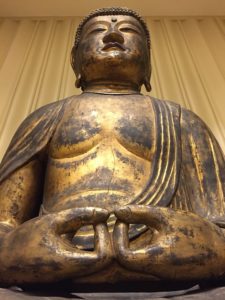It is an only Western cultural bias that questions the positive relationship between spirituality and atheism. Some adherents of Western religions aren’t very spiritual – they’re too brainwashed and tied up in fear due to childhood indoctrination. At the same time, many non-theists are very spiritual.
Atheism is not a disregard for religion in general, but only the non-belief in supernatural ruling beings called gods. That leaves a lot of elbow room for spirituality: a fact openly recognized and practiced by about one-third of humanity.
Assuming spirituality to necessarily involve gods is very closed-minded.
Spirituality is reflective, thoughtful, peaceful, and involves a sense of wonder. The strength and depth of such feelings can vary, and surprise one with intensity, then nearly disappear for long stretches of time. Some say belief in god gives them these feelings – but this isn’t where everyone gets them.
Spirituality is how human beings relate, on a personal level, to the world around them – the more spiritual a person feels in a given moment, the more at home she feels in the universe. There’s no rule saying that this relationship has to even involve the supernatural (let alone gods), although it often does.
Buddhism as Spiritual Atheism
Buddhism is the most obvious example of spiritual atheism: aside from a few small sects, it is largely an atheistic religion. The religion is very compatible with science and critical thinking – the Dalai Lama has even said that if a Buddhist tenet were shown incorrect by science, Buddhism would have to change.
 This, of course, takes nothing away from Buddhism’s spirituality; on the contrary, it adds to it. Adherents focus on the patterns inherent in the objective world while remembering the innate downfalls of having a sense of ‘self,’ which keeps humans separated from external reality – the only true reality. Buddhism is about being so humble before the majesty of the universe as to actually ‘forget’ oneself.
This, of course, takes nothing away from Buddhism’s spirituality; on the contrary, it adds to it. Adherents focus on the patterns inherent in the objective world while remembering the innate downfalls of having a sense of ‘self,’ which keeps humans separated from external reality – the only true reality. Buddhism is about being so humble before the majesty of the universe as to actually ‘forget’ oneself.
Jainism and other religions
Other religions which fit along this vein include Jainism (an Indian religion which involves the soul, but no gods), Taoism (like Buddhism, but less supernatural), Zen (a very meticulous, abstract, philosophical sect of Buddhism), and if one considers it a religion, Humanism (adherents believe in caring for humanity, primarily).
Still, it must be noted that atheists, especially in the Western world, tend to generally be skeptics – they don’t believe in ghosts, the afterlife, or any other supernatural thing. While open to evidence supporting supernatural claims, they know that no satisfactory evidence yet exists to support them.
So, what of these people? Where does their spirituality lie? To find out, throw away the notion that belief in the disproven and unprovable in any way augments the human quest for spiritual completion: it doesn’t. How can a person feel at home in the universe without looking as closely as possible about what the universe really is, and how it really works? This is best done with a critical, scientific mind.
Many scientists – who do tend, overwhelmingly, to be atheists and skeptics – find great joy in their work, leading to a strong, naturalistic spirituality. Astronomers like Carl Sagan and Stephen Hawking have found spirituality in the wondrous structures of the heavens; biologists like Richard Dawkins are spiritually at home with their understanding and constant exploration of the mechanisms of life. None require a god, or any other supernatural proposition, to be spiritual people.
It is arguable that atheistic spirituality is stronger and more complete than theistic spirituality – the argument hinges on how ‘spirituality’ is defined. If spirituality is about using the inquisitive, thinking, non-dogmatic mind to understand and accept one’s actual place in the universe, the atheistic wins, hands-down.






